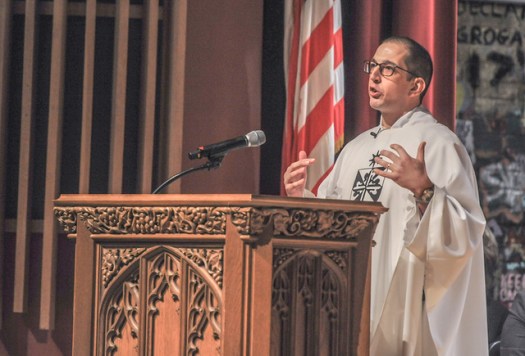By Student Preaching Team Member Grant Schleiter ’23 (Elmhurst, IL)
Lent is a time when Christians focus on the three pillars of fasting, prayer and alms giving. Today is Ash Wednesday, the kickoff of Lent, or as I used to think of it in grade school “the day when we compete to see who can keep their ashes on the longest.” Lent is known as a time of sacrifice. When I was little, Lent was always a competition in my family. Lent was always “who could give up the most difficult thing.” This competition was mostly between my sister and me, and it was a battle of who could succeed at a harder Lenten promise. One year, I took it so far I gave up added sugar, and it came to the point I was searching up menus of fast-food restaurants to make sure I was beating my goal. Having sugar-free yogurt every morning for 40 days is absolutely disgusting. I do not recommend it.

But what I was doing was actually the exact opposite of what Jesus says to do. In the Gospel today, Jesus says, “When you fast, do not look gloomy. When you give alms, do not blow a trumpet. When you pray, pray in secret.” Instead, I was making it known to everyone that I was struggling with a difficult penance — and was making it known that mine was more extreme. I was not sacrificing for God but rather for my own bragging rights.
As Fenwick students, we are called out to follow these three pillars. Prayer obviously is something we practice every day; at the beginning of second period we usually get to hear the enthusiastic voice of Charlize Guerrero, or maybe, every once in a while, the deep voice of Lee O’Bryan.
Fasting is the pillar most people associate with Lent. Many people associate Lent with giving up food, but you can also change a practice of something, like working out every day, or being nicer to a sibling, or going on your phone less. Fasting from something that distracts you from God can free up more time to do something to praise God. Something as easy as reflection through prayer could be done, or maybe you take it a step up and do charity work to accomplish almsgiving.
All of these actions help us become better people, and in becoming better people, we grow closer to God. In making time for God in your life, you are making time for goodness. Another thing about Lent is once you start to get into a routine, it is hard to snap out of it. When I did my sugar fasting, as soon as I hit Easter I had about 40 cookies and probably half of the lamb cake. All I was focusing on was “getting to Easter so I could enjoy sugar again.” Yes, some bit of fasting is to compensate for the 40 days Jesus spent in the desert, which is your typical giving up foods you like; but usually we go back to these after Lent, so maybe this year focus on something that you could build into a new routine — something you can do that can make your life better. Maybe instead of looking at your phone in the morning, talk to one of your parents; or if your parents are not awake, maybe take some time for silent meditation. You could even read the daily Bible verse. Do something simple that can help bring you closer to God. Jesus died for our sins and there’s no point in going right back to them after Lent. Instead, use it as a time to realize what you can change in your life to bring you closer to God.

Lent is a season where we must turn away from pleasures and see how we can redistribute our time for the needs of others and the needs of God. Lent is not a season for bragging; instead it is a season for serving. Focus on serving God and our neighbors. Do something that can help make a positive impact on others. Giving up sugar was something that did not make a positive impact on others; I think it only helped the Oikos yogurt brand. Do something that brings you closer to God.






























